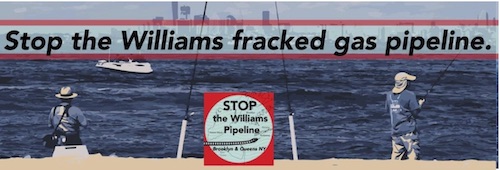ACTION ALERT: New York State Department of Environmental Conservation (NYS DEC) extended the comment period on Williams/Transco’s 5/17/19 reapplication for a Water Quality Certification to July 13, 2019.

| Williams/Transco’s application for a Water Quality Certification (WQC) was rejected by NYS DEC on May 15, 2019, because: | Williams/Transco re-applied on May 17. |
| *the pipeline “would result in greenhouse gas (“GHG”) emissions, which cause climate change and thus indirectly impact water and coastal resources.” | When Williams re-applied on May 17, 2019, it responded that, “without agreeing that this comment is relevant to the Water Quality Certification,” building the NESE would reduce GHG emissions. To make this claim, Williams hypothesized that if all 400,000 dekatherms of the gas delivered through the pipeline in an entire year were burned in boilers that would otherwise burn #2 fuel oil, 2.80 million metric tons less carbon dioxide equivalents would be emitted in a year. |
| *construction would cause “mortality, injury, or temporary displacement of the organisms living on, in, or near the 87.8 acres of seafloor directly affected by the Project” *construction of the NESE “would have major impacts to habitats due to the disturbance of shellfish beds and other benthic resources.” | In Williams’ re-application submitted on May 17, 2019 (“WQC Application”), it responded that, while indeed, construction of the proposed pipeline would indeed destroy whatever shellfish beds lay in its path, it would offer “compensatory mitigation.” Williams would give $3.4 million to the Long Island Shellfish Restoration Project, a NYS project that seeks to restore native shellfish to Long Island. |
| *the construction schedule did not provide any buffers that would keep it from impinging on “time-of-year” restrictions to protect threatened & endangered species should Williams encounter any delays. These restrictions ensure that vulnerable species can migrate and spawn without impediment. In New York State, the time-of-year restriction runs from January 1 through the end of April. Construction delays could result from an extreme weather event, equipment failure, an unexpected difficulty with seafloor geology, etc. | In its re-application on May 17, 2019, Williams responded that it had made the construction plan shorter to ensure that it wouldn’t impinge on the migration and spawning of sensitive marine species. It did so by hiring more construction equipment that would operate simultaneously along the length of the planned route. Williams now says it would complete the offshore portion of the NESE project in seven months, with an extra month available if there are delays. Yet at the same time, Williams is promising to slow down the dredging process in some areas to address DEC’s concern that toxic contaminants will be released at levels that exceed the state’s water quality standards. In short, the construction schedule is not credibly designed to ensure that the project meets water quality standards. |
| * “most notably . . . water quality standards for both mercury and copper are projected to be exceeded in certain areas in New York State waters.” The DEC also noted “significant water quality impacts from the resuspension of sediments.” | When Williams re-applied on May 17, 2019, it responded that at points along the construction path where mercury and copper would be particularly prevalent, it would slow the dredging and, with regards to mercury, also halt it completely for 1 hour at each ‘slack-tide’ period (i.e, the high tide and low tide intervals). Williams claimed that this would resolve the DEC’s concerns about mercury and copper. Williams also offered new information that asserted that the total suspended solids generated by filling in the trench at certain spots would be significant only close to the sea floor. |
Comment ideas have been provided by the NY Coalition – STOP THE WILLIAMS PIPELINE NY (NESE PIPELINE) CAMPAIGN ORGANIZED BY 350BK, SURFRIDER NYC CHAPTER, SANE ENERGY PROJECT, FOOD & WATER WATCH, NEW YORK COMMUNITIES FOR CHANGE, 350, SUSTAINABLE STATEN ISLAND AND ROCKAWAY BEACH CIVIC ASSOCIATION.
Here are four-sample comment prompts that have background information to make it easy to submit a comment to the DEC:
- Comment 1: Climate Change
- Comment 2: Impact on Shellfish and Other Benthic Organisms
- Comment 3: No Safe Construction Schedule
- Comment 4: Contaminants and Sediments
**Keep an eye out for more comment prompts over the next month**